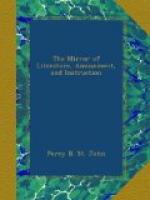[1] United Service Journal, Jan. 1832.
* * * * *
THE SELECTOR; AND LITERARY NOTICES OF NEW WORKS.
FRANCIS THE FIRST.
An Historical Drama. By Frances Ann Kemble.
This extraordinary production has awakened an interest in the dramatic and literary world, scarcely equalled in our times. We know of its fortune upon the stage by report only; but, from our acquaintance with the requisites of the acting drama, we should conceive its permanence will be more problematical in the theatre than in the closet; and considering the conditions upon which dramatic fame is now attainable, we think the clever authoress will not have reason to regret these inequalities of success. That Miss Kemble’s tragedy possesses points to be made, and passages that will tell on the stage, cannot be denied; but its interest for representation requires to be concentrated; it “wants a hero, an uncommon thing.” It is well observed in the Quarterly Review, (by the way, the only notice yet taken of the tragedy, that merits attention,) that “the piece is crowded with characters of the greatest variety, all of considerable importance in the piece, engaged in the most striking situations, and contributing essentially to the main design. Instead of that simple unity of interest, from which modern tragic writers have rarely ventured to depart, it takes the wider range of that historic unity, which is the characteristic of our elder drama; moulds together, and connects by some common agent employed in both, incidents which have no necessary connexion; and—what in the present tragedy strikes us as on many accounts especially noticeable—unites by a fine though less perceptible moral link, remote but highly tragic events with the immediate, if we may so speak, the domestic interests of the play.” This language is finely characteristic of the drama. Again, the interest has “so much Shakspearianism in the conception as to afford a remarkable indication of the noble school in which the young authoress has studied, and the high models which, with courage, in the present day, fairly to be called originality, she has dared to set before her. In fact, Francis the First is cast entirely in the mould of one of Shakspeare’s historical tragedies.” The drama too was written without any view to its representation, as the Quarterly reviewer has been “informed by persons who long ago perused the manuscript, several years before Miss Kemble appeared upon the stage, and at a time when she little anticipated the probability that she herself might be called upon to impersonate the conceptions of her own imagination. We believe that we are quite safe when we state that the drama, in its present form, was written when the authoress was not more than seventeen.” Yet it should be added that the above statement is not made by way of extenuation; for, to say the truth, it needs no such adventitious aid.




